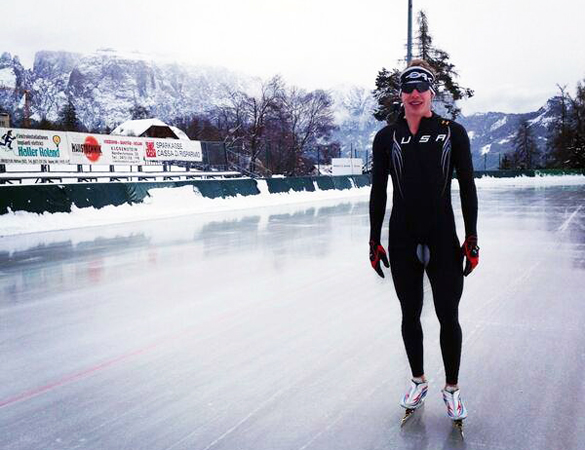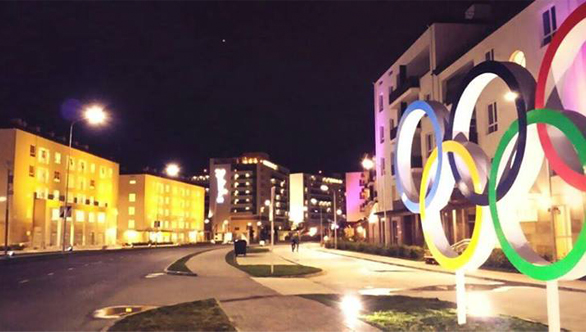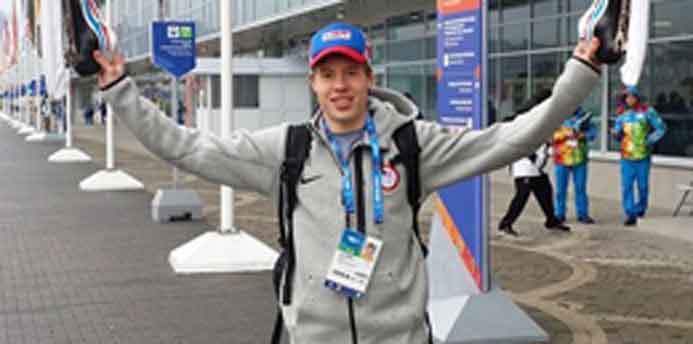Brian Hansen has cleared off shelf space for another trophy of excellence.
But unlike most athletes his age, Hansen is competing for an Olympic medal—or four—this week in Sochi at the Winter Olympics.
The 23-year-old Glenbrook South High School alum now trains primarily in Milwaukee, where he also attends Marquette University, but he still spends part of the year training in Glenview, where his family resides. He took up speed skating in his youth, and his passion has blossomed into an exceptional talent.
In high school, Hansen juggled school and competitive skating, squeezing in morning workouts and regularly driving more than an hour after school to Milwaukee’s Pettit National Ice Center. Appearing in Sochi in his second Olympics—he received a silver medal in Vancouver in 2010 in team pursuit—Hansen has refocused, growing from a wide-eyed underdog to a serious competitor.
In his spare time, Hansen founded a start-up company with younger brother Stevie, 21: bottlebark. “The athletes’ Koozie” combines the popular foam rollers used for stretching with a standard water bottle, using the foam roller as an insulating sleeve. The foam rollers, made at the same factory as the famed Green Bay Packers cheeseheads, are a passion project for the brothers, combining Brian’s athleticism with Stevie’s design knowledge as an engineering student at University of Wisconsin-Madison.
Hansen talked the Olympics with Make It Better, including his excitement for Sochi, his favorite North Shore skating spots, and how speed-skating newcomers can get started.
Make It Better: How did you first get involved in speed skating?
Brian Hansen: I played hockey, so I already knew how to skate, and a family friend recommended I try speed skating. We tried it at the Northbrook Speed Skating Club, and I liked it at the time and stuck with it.

What does training entail?
Usually, I train 10 workouts a week. In season, starting around August, five of those workouts are skating and five are off-ice. Of the five off-ice workouts, two are weights, one is what we call “dry land,” which is jumps and skating-position-like exercises, and usually the rest are biking workouts.
What do you enjoy most about competitive speed skating?
The traveling is a lot of fun; you get to go to a lot of interesting places. I think seeing the same group of athletes from all around the world and all these different countries is kind of fun. Sometimes you go to Germany, and you’re in the mountains, and you go to the Netherlands, and it’s a totally different feeling. It’s exciting enjoying the different types of rinks and traditions.
How was your initial experience at your first Olympics in Vancouver?
I was the youngest long-track skater on the U.S. Olympic team, so I was happy just to be there. It was really exciting for me. And when we won the silver medal in the team pursuit, it was an unexpected surprise. Overall, it was everything I’d hoped it was be.
What was unexpected about that win?
We were definitely underdogs in the race. We were going against two of the top guys, who’d both won individual distances prior to that, so we were pretty much expecting to lose. But we beat them!
How did you feel about being the youngest person on the team?
I was just enjoying the fact that I was there. I didn’t feel that I had too much pressure to really do anything except win the team pursuit, which we did. Everyone was supportive, so it wasn’t too intimidating to be there, and I was friends with pretty much everybody on the team.
What keeps you motivated?
Right now, the Olympics are my motivation. Generally speaking, I think there are different levels of enjoyment in the sport, and I think one of the most basic levels is just doing a sport and having fun with it. I think that’s the easiest way to stay motivated. And the next thing is having goals and competitions and trying to better yourself and hit a personal best. And then there’s the level I’m working at, just because I’ve been doing it for so long, and that’s the Olympics.
How are you changing and gearing up for Sochi?
I know what to expect a little bit more. My focus is more on the Olympics than it was before. Last time, I was so happy, I was in a mode where I just wanted to enjoy it and take it all in. Now, I think I know what to expect, and that has helped me prepare a bit more.

What are your greatest achievements outside of the Olympics?
There are five individual distances in speed skating and then the team pursuit, so six events. This fall, I competed in 1,000, 1,500 and team pursuit, and between those distances, I won five medals and two World Cups. Last year, I won a gold medal in the 1,000-meter, which was my first individual World Cup medal.
Where is your favorite place to skate when you come home?
Northbrook for speed skating, but for the fun of it, Millennium Park in my hockey skates with friends.
You graduated from GBS with (Olympic speed skater) Lana Gehring. Did you ever train together?
We both started skating at Northbrook Speed Skating Club, and we grew up skating together. We trained together until we were about 14 or so, and though we’re still skating together, she moved out to Salt Lake City, and I started focusing more on long-track.
Any words of advice for people who may want to get involved with something like speed skating?
Northbrook is a great club to start out at, whether you’re just learning to skate or you’re an expert. That’s the beauty of the club: You don’t have to be a top-level skater. Northbrook is really made for younger kids or beginners or people learning to skate. Evanston, Park Ridge and Glen Ellyn also have speed skating clubs, and every one of those clubs is a great to start, especially for kids. Even if you don’t have skates, you can just go check it out. Often times, they will give you speed skates to try or to rent. They make it easy to come try it out without being a high-level skater.
Follow Brian’s Sochi journey on Instagram and Twitter.
Photos courtesy of Brian Hansen

